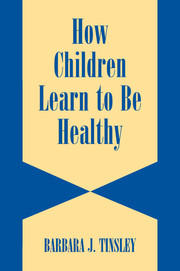Book contents
- Frontmatter
- Contents
- Acknowledgments
- How Children Learn to Be Healthy
- Introduction
- 1 Mechanisms and Consequences of Socializing Children to Be Healthy
- 2 Children's Health Understanding and Behavior
- 3 Parents' Health Beliefs
- 4 Parents' Promotion of Their Children's Health
- 5 Parents' Promotion of Their Children's Sexual Health
- 6 Peers, Schools, and Children's Health
- 7 How Television Viewing and Other Media Use Affect Children's Health
- 8 The Social Ecology of Children's Health Socialization
- 9 Summary and Conclusions
- References
- Index
4 - Parents' Promotion of Their Children's Health
Published online by Cambridge University Press: 27 July 2009
- Frontmatter
- Contents
- Acknowledgments
- How Children Learn to Be Healthy
- Introduction
- 1 Mechanisms and Consequences of Socializing Children to Be Healthy
- 2 Children's Health Understanding and Behavior
- 3 Parents' Health Beliefs
- 4 Parents' Promotion of Their Children's Health
- 5 Parents' Promotion of Their Children's Sexual Health
- 6 Peers, Schools, and Children's Health
- 7 How Television Viewing and Other Media Use Affect Children's Health
- 8 The Social Ecology of Children's Health Socialization
- 9 Summary and Conclusions
- References
- Index
Summary
Childrearing: A Pathway Between Parents' Beliefs and Behavior
One pathway through which parent and child similarity in health beliefs may occur is through parental childrearing behavior. The classic study relating parents' childrearing behavior to children's health behavior was performed by Pratt (1973). This interview investigation of 273 families (mother, father, and 9- to 13-year-old children) involved assessing the relations between childrearing styles and child health behaviors (e.g., toothbrushing, exercise, nutritional practices). Pratt identified a style of parenting she termed the energized family, which was related to the highest levels of child health practices. The parents in these energized families gave their children a high degree of autonomy and used reasoning rather than punishment as a discipline strategy. Although most of the correlations were low, Pratt reported that childrearing practices had a significant effect on children's health behavior even when the parents' own health behaviors are controlled. Childrearing attitudes that recognized the child as an individual and fostered the child's assumption of responsibility were associated with positive health behavior in children (toothbrushing, good sleep habits, exercise, good nutritional practices, and refraining from smoking). In contrast, children raised in families with an autocratic style of childrearing were not as likely to practice such behaviors. The study was weakened by reliance on the children's perceptions of their parents' childrearing practices even when evidence from the parents themselves was available. Moreover, the independent contribution of mothers' childrearing practices, separately from those of fathers, was not examined separately.
- Type
- Chapter
- Information
- How Children Learn to be Healthy , pp. 39 - 56Publisher: Cambridge University PressPrint publication year: 2002



